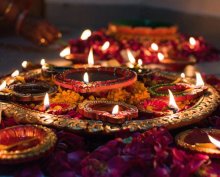
By the members of the South Asian Society – Avani, Jaspreet and Payal.
Diwali, often referred to as the “Festival of Lights'' comes from the Sanskrit word ‘Deepavali’ meaning “rows of lighted lamps.” It is a five-day celebration and symbolises the spiritual victory of light over darkness, good over evil and knowledge over ignorance. The Festival of Lights is celebrated by Hindus and Jains, and Sikhs celebrate Bandi Chhorh Divas which fall at a similar time of year. In some parts of India, the day after Diwali is celebrated as the Hindu New Year.
The significance of Diwali to Hindus is to do with the story of Lord Rama. According to Hindu mythology, when Lord Rama returned victorious after killing the demon Ravanaa, the people of his kingdom welcomed him, his wife Sita and his brother Lakshmana by lighting thousands of Diyas, and celebrating. This was turned into an annual festival, with the celebrations today signifying new hope and promise.
Sikhs celebrate the release of the sixth guru, Guru Hargobind Singh, from prison in 1619. This event is also known as Bandi Chhors Diva. The Golden Temple in Punjab, India is lit up to celebrate the return of Guru Hargobind.
Diwali is celebrated religiously and culturally over multiple days. People decorate their homes and streets with lights and set off fireworks to overcome evil and darkness. Food plays a huge factor in Diwali celebrations; a feast of South Asian food is prepared for the whole family to eat. People create Rangoli patterns out of powdered materials such as flower petals to welcome guests into your home as it represents positivity, as well as perform worship ceremonies of the goddess Lakshmi (goddess of prosperity and wealth).
Children often paint Diyas, a clay candle holder, in order to liven it up. We asked some students that are celebrating Diwali to reflect on their experiences, and share their favourite bits!
Payal Juhi Lad (Year 11) said: “Over the past few days I’ve been helping my mum cook some sweet and savoury snacks, and helping my dad to put up lights and other decorations. On Diwali we will have a family dinner, open some presents and set off fireworks in the evening. On the next day I will visit the temple and my grandparents for their blessings. Diwali is my favourite Indian festival, I look forward to it every year!”
Matisha Joshi (Upper Sixth) said: “My favourite part about Diwali is getting together with my family. After not being able to spend time together because of Covid and multiple lockdowns, Diwali is the perfect opportunity for us to come together to celebrate and pray for the wellbeing of others. Typically, my family will hold a puja (prayer ceremony) and then eat a large home cooked meal, and after dinner we will swap presents and set off fireworks and sparklers.”
Avani Tambe (Lower Sixth) said: “In my family, it’s tradition to work together to make a lantern out of folded paper. The festival also involves making all sorts of delicious dishes and sweets, and eating them is always my favourite part! This year, we’re also seeing some family friends which is a nice way to connect and celebrate.”





















